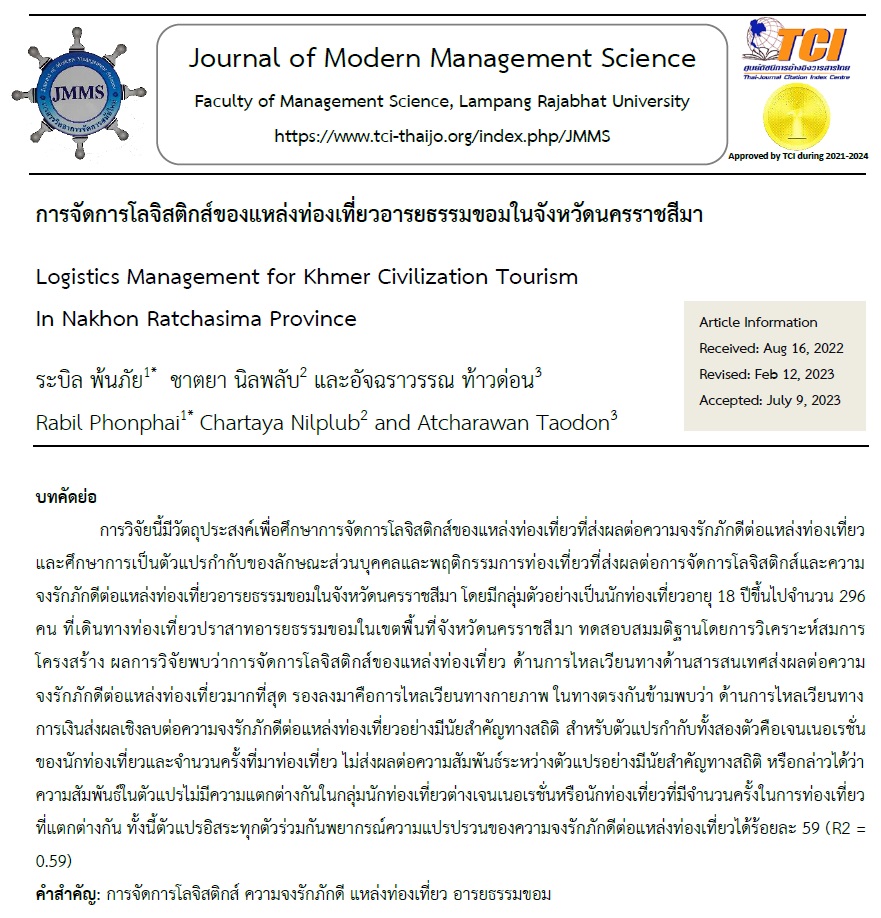Logistics Management for Khmer Civilization Tourism In Nakhon Ratchasima Province
Main Article Content
Abstract
This research aims to examine the effect of logistics management on tourist loyalty and the moderating role of personal characteristics and tourist behaviors on the relationship between logistics management and loyalty to tourist attractions of Khmer civilization in Nakhon Ratchasima province. The sample consisted of 296 tourists aged 18 years and over who traveled to tourist attractions of Khmer civilization in Nakhon Ratchasima province. The hypotheses were tested by structural equation modeling. The results showed that logistics management in the dimension of information flow had the strongest significant effect on tourist loyalty followed by the physical flow. In contrast, the financial flow dimension was found to have a significant negative effect on loyalty. The two moderators which are generation of tourists, and the number of visits has no statistically significant roles on the relationship between the variables in the model which could be concluded that the impact of tourism logistics management was not different among tourists of different generations or different number of visits. All the independent variables can predict 59 percent of the overall variance in loyalty to tourist attractions (R2 = 0.59).
Article Details

This work is licensed under a Creative Commons Attribution-NonCommercial-NoDerivatives 4.0 International License.
The article must be considered and accepted for publication by the editorial board of the Faculty of Management Science, Lampang Rajabhat University. The articles have been reviewed by a peer (peer review) and the author must update according to the suggestion if available before publication. Articles that are not considered the editorial team will inform the results of the consideration but will not send the original to the author.
JMMS is the Faculty of Management Science journal, Lampang Rajabhat University. Jmms published both print and online editions. We allow the use of articles for academic use under the scope of copyright law.
References
ชัยธวัช ทองอินทร์. (2549). กระบวนทัศน์ของการจัดการโลจิสติกส์สำหรับอุตสาหกรรมการท่องเที่ยวไทย. [ออนไลน์] Available: http://www.thailog.org/research.html. ค้นเมื่อ [2565, สิงหาคม 1].
ฐิติมา รัตนพงษ์. (2558). ผลกระทบของความผูกพันและความพึงพอใจที่มีต่อแนวโน้มการกลับมาเที่ยวซ้ำยังแหล่งท่องเที่ยวในจังหวัดนครศรีธรรมราช. (วิทยานิพนธ์ตามบริหารธุรกิจมหาบัณฑิต สาขาวิชาการจัดการท่องเที่ยว). สงขลา: มหาวิทยาลัยสงขลานครินทร์.
เถกิงศักดิ์ ชัยชาญ. (2555). การจัดการโลจิสติกส์สำหรับการท่องเที่ยวในอำเภอวังน้ำเขียวจังหวัดนครราชสีมา. รายงานวิจัย. นครราชสีมา: มหาวิทยาลัยเทคโนโลยีสุรนารี.
ทักษิณา คุณารักษ์. (2544). ปัจจัยในการเลือกแหล่งท่องเที่ยวและที่พักของเยาวชนไทยกรณีศึกษา นักศึกษาระดับปริญญาตรี มหาวิทยาลัยเชียงใหม่. เชียงใหม่: คณะมนุษย์ศาสตร์ มหาวิทยาลัยเชียงใหม่.
เทิดชาย ช่วยบำรุง. (2553). พลวัตการท่องเที่ยวอีสานใต้ค้นหารอยยิ้มร่วมสมัยแห่งกาลเวลา. กรุงเทพมหานคร: เอ็มไอทีพริ้นติ้ง.
นงลักษณ์ วิรัชชัย. (2542). โมเดลริสเรล : สถิติวิเคราะห์สำหรับการวิจัย. กรุงเทพมหานคร : โรงพิมพ์จุฬาลงกรณ์มหาวิทยาลัย
ปณิชา ตันสูติชล. (2560). การจัดการโซ่อุปทานการท่องเที่ยวในเกาะเต่า จังหวัดสุราษฎร์ธานี. (วิทยานิพนธ์สาขาการจัดการโลจิสติกส์และโซ่อุปทาน). มหาวิทยาลัยศรีปทุม.
มติชนออนไลน์. (2563). การจัดการท่องเที่ยวเชิงประวัติศาสตร์ (ตอนที่ 1): โดย ปรีดี พิศภูมิวิถี. Available: https://www.matichon.co.th/article/news_2344210. ค้นเมื่อ [2565, มีนาคม 3].
วรพงศ์ ผูกภู่, ฐิติ ฐิติจำเริญพร,วุฒิพงษ์ ฉั่วตระกูล, อิสรี แพทย์เจริญ, พินทุสร อ่อนเปี่ยม และ จิตรลดา ปิ่นทอง. (2564). รูปแบบการพัฒนาชุมชนท่องเที่ยวเชิงวัฒนธรรม กรณีศึกษาพื้นที่ต้นแบบชุมชนท่องเที่ยวเชิงวัฒนธรรม. กรมส่งเสริมวัฒนธรรม กระทรวงวัฒนธรรม. กรุงเทพฯ. กรมส่งเสริมวัฒนธรรม
วาสนา จรูญศรีโชติกำจร, สุภาภรณ์ หมั่นหา, การันต์ เจริญสุวรรณ, กนิษฐา ศรีภิรมย์, วรางค์ รามบุตร และชลธิชา แสงงาม.(2560). ประสิทธิภาพการจัดการโลจิสติกส์ของแหล่งท่องเที่ยวจังหวัด กำแพงเพชร. วารสารวิทยาการจัดการสมัยใหม่คณะวิทยาการจัดการมหาวิทยาลัยราชภัฏลําปาง, 10(2), 213-229.
ศูนย์วิจัยกสิกรไทย. (2562). ชูจุดขาย สร้างจุดเด่น รับกระแสรักษ์โลก" โอกาส...ผู้ประกอบการท่องเที่ยวปรับตัว. [ออนไลน์] Available: https://www.kasikornresearch.com/th/analysis/k-social-media/Pages/FB-05-01-2022.aspx. ค้นเมื่อ [2565, มีนาคม 3].
สมาคมผู้สื่อข่าวไทย – จีน. (2562). ผลวิจัยเผยการท่องเที่ยวมวลชนสร้างรายได้ให้ชุมชน. [ออนไลน์] Available: https://www.tcjapress.com/2019/07/08/patong-beach-koyao-island/.ค้นเมื่อ [2565, มีนาคม 3]
สำนักงานสภาพัฒนาการเศรษฐกิจและสังคมแห่งชาติ. (2564). ร่างกรอบแผนพัฒนาภาค พ.ศ. 2566-2570. [ออนไลน์] Available: https://www.nesdc.go.th/ewt_dl_link.php?nid=11684&filename= index. ค้นเมื่อ [2565, มีนาคม 7].
สิริวรรณ เรืองรอง. (2547). การประยุกต์ใช้ฐานข้อมูลสารสนเทศภูมิศาสตร์เพื่อพัฒนาโปรแกรมสารสนเทศแหล่งท่องเที่ยวอารยธรรมขอมในพื้นที่อีสานใต้. (ปริญญานิพนธ์วิทยาศาสตรมหาบัณฑิต สาขาภูมิศาสตร์). มหาวิทยาลัยศรีนครินทรวิโรฒประสานมิตร.
สืบชาติ อันทะไชย. (2556). การจัดการตลาด. กรุงเทพฯ : โอเดียนสโตร์.
อดิศัย วรรธนะภูติ จันทนา แสนสุข อภิชยา นิเวศน์ และสุตาภัทร จันทร์ประเสริฐ. (2562). การพัฒนารูปแบบการจัดการโลจิสติกส์เพื่อการท่องเที่ยว อำเภอพระนครศรีอยุธยา จังหวัดพระนครศรีอยุธยา. รายงานวิจัย. มหาวิทยาลัยเทคโนโลยีราชมงคลสุวรรณภูมิ.
Alegre, J., & Cladera, M. (2009). Analysing the effect of satisfaction and previous visits on tourist intentions to return. European Journal of Marketing. 43(5): 670-685.
Cheunkamon, E., Jomnonkwao, S., & Ratanavaraha, V. (2021). Impacts of tourist loyalty on service providers: Examining the role of the service quality of tourism supply chains, tourism logistics, commitment, satisfaction, and trust. Journal of Quality Assurance in Hospitality & Tourism, 23(1) 1-33.
Cronbach, L. J. (1951). Coefficient alpha and the internal structure of tests. psychometrika, 16(3), 297-334.
Hair, J. F., Black, W. C., Babin, B. J., Anderson, R. E., & Tatham, R. L. (2006). Multivariate data analysis 6th Edition. Pearson Prentice Hall. New Jersey. humans: Critique and reformulation. Journal of Abnormal Psychology, 87, 49-74.
Hoogland, J. J., & Boomsma, A. (1998). Robustness studies in covariance structure modeling: An overview and a meta-analysis. Sociological Methods & Research, 26(3), 329-367.
Kline, R. B. (1998). Software review: Software programs for structural equation modeling: Amos, EQS, and LISREL. Journal of psychoeducational assessment, 16(4), 343-364.
Liang, H. C. (2008). Impact of logistics service performance on tourist satisfaction and loyalty (Doctoral dissertation, RMIT University).
Nicolau, J. L., & Mas, F. J. (2005). Stochastic modeling: a three-stage tourist choice process. Annals of Tourism Research, 32(1), 49-69.
Oppermann, M. (2000). Tourism destination loyalty. Journal of travel research, 39(1), 78-84.
Reichheld, F. F., & Sasser, W. E. (1990). Zero defections: quality comes to services. Harvard Business Review, 68(5), 105-111.
Ryan, C., & Cliff, A. (1997). Do travel agencies measure up to customer expectation? An empirical investigation of travel agencies' service quality as measured by SERVQUAL. Journal of Travel & Tourism Marketing, 6(2), 1-31.
Velázquez, B. M., Saura, I. G., & Molina, M. E. R. (2011). Conceptualizing and measuring loyalty: Towards a conceptual model of tourist loyalty antecedents. Journal of vacation marketing, 17(1), 65-81.
Zeithaml, V. A., Berry, L. L., & Parasuraman, A. (1996). The behavioral consequences of service quality. Journal of marketing, 60(2), 31-46.


